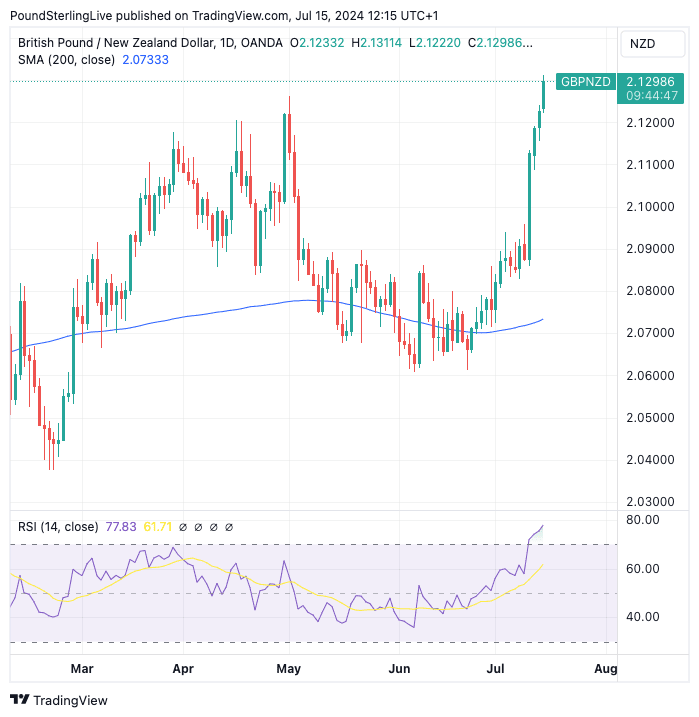GBP/NZD Week Ahead Forecast: Heavily Overbought into UK Data Risk
- Written by: Gary Howes
-

NZ's housing industry is struggling under the weight of high interest rates. Image © Adobe Images
The Pound to New Zealand Dollar exchange rate can deliver more gains in the coming week, but beware of overbought conditions and any pullback if UK wage and inflation figures undershoot midweek.
The New Zealand Dollar is under pressure at the start of the new week following another domestic data set that will bolster the odds of a Reserve Bank of New Zealand interest rate cut before the year ends.
Kiwi house prices declined markedly in June, according to REINZ house sales. The house price index printed -0.1% month-on-month, bringing the annual figure down to +1.3% y/y from 2.3% previously.
This was after house sales fell 16.7% m/m in June, taking the annual change in turnover down to -25.6% from a positive 6.8% previously.
"Slow momentum in the housing market since last year's election, combined with the RBNZ’s 'tough love' message of keeping interest rates high for longer were the key factors," says Michael Gordon, Senior Economist at Westpac.
These housing data are the latest to make the case for an interest rate cut at the RBNZ, which is weighing on the NZ Dollar more broadly.
Last week the RBNZ performed what analysts described as a 'pivot' by signalling it now sees an interest rate cut as appropriate in the coming months. It said it expects "headline inflation to return to within the 1 to 3 per cent target range in the second half of this year."
It added that restrictive monetary policy (i.e. elevated interest rates) "will be tempered over time consistent with the expected decline in inflation pressures."
NZD weakness and broader GBP outperformance is clearly visible in a rallying GBP/NZD exchange rate, which last week recorded its strongest one-week gain since May of 2023. Gains extend into the new week and the pair is now quoted at 2.1295.
Momentum indicators are now suggesting some caution is warranted as the RSI is at 77.80, which is excessively overbought. In fact this is the most overbought the RSI has been in years.
Above: GBP/NZD at daily intervals with the RSI in the lower panel. Track GBP/NZD with your custom alerts; find out more here.
We suggest a pullback is now warranted, although weakness is anticipated to be shallow. In the bigger picture, the pair trades above its key moving averages, and we see no incentive to stand in the way of the trend.
Following any near-term pullbacks, the next upside target is the 2023 peak at 2.1587, which can be attained in the coming two to four weeks. Near-term risks to GBP are relatively elevated as we have the release of inflation numbers on Wednesday, followed by wages on Thursday.
"We are still holding on to our call for an August rate cut, but another upside surprise for services inflation and/or wages would challenge our view and encourage a further strengthening of the GBP in the week ahead," says Lee Hardman, an analyst at MUFG Bank Ltd.
However, any undershoot against expectations can bolster the odds of an August 01 interest rate cut at the Bank of England and see GBP/NZD give back recent gains.
Services inflation is expected to read at 5.6% and headline CPI inflation is forecast to read at 2.0%. Any undershoot would raise the odds of an August 01 rate cut and send an overbought Pound-Euro sharply lower.
Analysts at Oxford Economics reckon the headline CPI inflation print will land at 1.8%, an outcome that would represent a decent undershoot and prompt a selloff in the Pound.
"Considering the GBP has been the best performing G-10 currency QTD, we think it remains prone to a larger correction if CPI print comes in lower than expectations," says Daragh Maher, Head of FX Strategy at HSBC.
The sell-off in the Pound would be limited because the Bank of England will find it difficult to cut aggressively if the economy continues to perform robustly, something a number of economists said was likely following last week's GDP release.
Regarding the wage numbers on Thursday, the expectation is for average weekly earnings to have increased 5.8% over the year to June. Anything below here would result in GBP selling.


